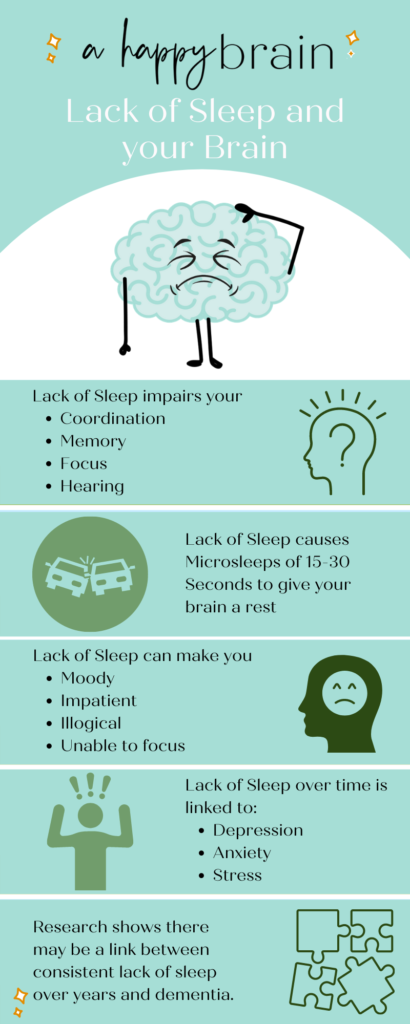Have you ever wondered about sleep and the brain? For example, how does sleep affect the brain? Do we really need sleep at all? The science of sleep is a mysterious and fascinating subject, and one in which research is still very much ongoing. In fact, researchers are still unable to agree on why we actually need sleep at all. All we really know is that without it, we soon fall to pieces!
The negative effects of sleep deprivation are quick to present and soon become overwhelming. Within 24 hours of not sleeping, your cognitive faculties are impaired, and even your hearing is starting to diminish1! Your coordination, memory and focus are all out of whack, and your brain is already starting to induce involuntary ‘microsleeps’ of 15-30 seconds2, just to give itself a rest.
While ‘all-nighters’ might be rare for most of us, far too many of us suffer from ‘sleep-debt’—mental and/or physical fatigue from lack of enough sleep. It’s all too easy to convince ourselves that we can ‘make do’ with little sleep. However, while we may be awake and functioning after insufficient sleep, our brains and bodies are often performing at far lower than optimum levels, both in the short and long term.
Unfortunately, in the early 21st century, many regard sleep as wasted time. In a fast-paced, hectic world, many squeeze down-time to a minimum. But that much-lauded image of stoical high-achievers functioning at their best on almost no sleep is not only totally false, but also dangerous. Read on to find out why.
What is Sleep?
So what happens when we sleep? To answer that, let’s delve a little further into the stages of sleep3 and their effects on our bodies.
There are four main stages of sleep:
- Stage one is just after you drift off—a light sleep which is easily disturbed. This is when you may get twitches in your muscles, a phenomenon known as a ‘myoclonic jerk’.
- The next stage is when your body is preparing for deep sleep. Physical changes happen; your heart rate slows, and your body temperature begins to drop. This stage usually lasts about 20 minutes.
- Stage three is often known as ‘non-REM’ sleep. This is a very deep sleep. You become less responsive and less easy to wake.The brain begins to produce slower waves, known as delta waves. During this stage, your body works on physical repairs—building bones, regrowing muscle tissue, and boosting your immune system. Some believe that memory consolidation starts to occur in this stage.
- The final stage, REM sleep, or Rapid Eye Movement sleep, usually occurs after about 90 minutes. During REM sleep, your brain activity increases, and your eyes begin to move and twitch, hence the name. The rest of your body relaxes, so you stay almost still. This is the stage of sleep where your brain files away and sorts information that it has absorbed throughout the day. Many experts describe this stage as the most important stage of sleep.
As the night progresses, and you go through several sleep cycles, the length of each REM period gets longer, up to a maximum of about an hour. After a period of REM sleep, you usually start at stage three again, and the cycle continues from there throughout the night until you wake up.
Why is Sleep Important?
When you don’t get enough sleep, or your sleep is disturbed, you’re unable to go through those stages properly. This has negative effects, both physically and mentally4. A lack of proper sleep very quickly leads to cognitive impairment—focus and concentration quickly go downhill, as does your ability to recall information5. Your mood will change, becoming increasingly irritable and impatient as the effects of sleep deprivation increase. Emotional responses heighten, meaning we become more irrational, and our decision making becomes blurred and illogical.
We all know how it feels to try to face the day after even one night of terrible sleep. Grogginess, tetchiness, general lack of enthusiasm and drive. Not surprisingly, the long term effects of lack of sleep over months or even years, are seriously detrimental to our wellbeing.
In the past, experts disputed whether Alzheimer’s caused poor sleep, or the other way around. Recent studies into Alzheimer’s and sleep have shown that during sleep our brains undergo a period of ‘housekeeping’, in which toxins (including those associated with Alzheimer’s disease) are literally flushed out6. These toxins, for example, ‘beta-amyloids’, are known to form plaques in the brain which inhibit communication between neurons7.
There is also considerable research showing a link between a lack of sleep and dementia8. Obstructive sleep apnea, which is literally where your face muscles are so relaxed that your breathing becomes obstructed, not only disrupts your sleep but causes you to struggle to get enough air as you sleep. For this reason, there is a proven link between sleep apnea and impaired cognitive function9.

Sleep More, Worry Less
Finally, not only does a bad night’s sleep cause you to feel less perky in the morning, bad sleep in the long run can cause depression, stress and anxiety10. The psychological effects of sleep deprivation are well documented, but often less obvious than the physical. In their research, scientists have honed in on a protein called BDNF, your brain’s growth hormone. Lack of sleep affects your body’s ability to produce BDNF correctly, which in turn increases vulnerability to depressive disorders11.
How Much is Too Much Sleep?
As we can see, in order to maintain a happy and healthy brain, sleep is absolutely crucial. Now, let’s move on to the million dollar question—how much sleep do you need? This comes down a lot to the individual, but the definitive answer is 7-9 hours12. For a healthy adult, 8 hours can be used as an ideal average. Doing your best to sleep for 8 hours will be beneficial to your health, both mental and physical, in both the short and the long term.
If you’re anything like me, you’ll also be delighted to hear that napping has been proven to be great for your brain health13, as long as those naps don’t go on for more than 90 minutes. Embrace the siesta!
As for overdoing it, sleeping more than 9 or 10 hours a night has actually been shown to be too much, and can have negative effects on your health14. Lie-ins at the weekend are definitely to be encouraged, but not every day of the week!
In our next article we’re going to explore some easy and natural ways to help you to get a great night’s sleep, and give your brain the rest it derves.
See you there!
- https://www.ncbi.nlm.nih.gov/pmc/articles/PMC3411400/
- https://www.researchgate.net/publication/46279672_Microsleep_Literature_Review
- https://www.sleepfoundation.org/articles/stages-of-sleep
- https://www.ncbi.nlm.nih.gov/pmc/articles/PMC4651462/
- http://ncbi.nlm.nih.gov/pmc/articles/PMC3768102/
- https://www.nih.gov/news-events/nih-research-matters/how-sleep-clears-brain
- https://www.nih.gov/news-events/nih-research-matters/sleep-deprivation-increases-alzheimers-protein
- https://www.aan.com/PressRoom/Home/PressRelease/1326
- https://www.ncbi.nlm.nih.gov/pmc/articles/PMC5281652/#:~:text=Obstructive%20sleep%20apnea%20(OSA)%20can,functions%2C%20attention%2C%20and%20memory.
- https://link.springer.com/article/10.1007/s11064-019-02914-1
- https://www.ncbi.nlm.nih.gov/pmc/articles/PMC5725585/
- https://www.sciencedaily.com/releases/2018/10/181009135845.htm
- https://www.webmd.com/sleep-disorders/physical-side-effects-oversleeping


Very interesting blog. I have participated in clinical research trials for the brain at the local National Institutes of Health. One clinical research trial included PET Imaging of Translocator Protein. It’s a great idea.
Terri,
Thanks for stopping by! That’s interesting that you participated in clinical research. Some of the research that’s being done is fascinating as well as empowering.
-Annissa